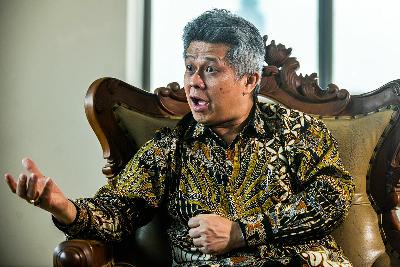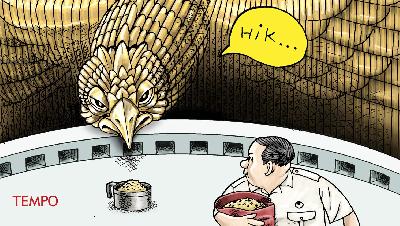Dirty Practices in Choosing BPK Members
Monday, September 2, 2024
Several political parties conspired to approve candidates for the Supreme Audit Agency (BPK) membership. Corrupt candidates could be selected.
arsip tempo : 174537553316.

ONCE again, the selection of members of the Supreme Audit Agency (BPK) is like trying to clean a filthy house with a dirty broom. The state auditor body that determines how public funds are used will be filled by people from political parties—the institutions that in Indonesia were set up to accommodate crooked interests. This state institution that used to be relied on to control development has now descended into a place for bartering corruption.
For years, members of the BPK have been involved in major corruption cases related to the buying and selling of audit results for regional governments and ministries, and even falsifying calculations of losses to the state in order to save a person accused of corruption. The amount of bribes from the trading of audit results was very large. This is why, given its extensive powers, many politicians who failed to be reelected to the House of Representatives in Senayan are lining up to register as prospective members of the BPK.
A few weeks ago, Achsanul Qosasi, a BPK member from the Democrat Party, was found guilty of taking a Rp40 billion bribe in relation to an audit for the supply of Internet networks at the Communication and Informatics Ministry. He took the money to remove evidence of losses in the project from the BPK audit. He was jailed for two years and six months, and fined Rp250 million.
Long before that, there was Rizal Djalil, a BPK member from the National Mandate Party (PAN) who was jailed for four years for taking a Rp1 billion bribe from the president commissioner of Minarta Dutahutama. Rizal pushed for the company to win a main water supply distribution network project at the Ministry of Public Works and People’s Housing. Rizal guaranteed that the project audit would be smooth.
Then there was Pius Lustrilanang, a BPK member from the Gerindra Party. The Corruption Eradication Commission (KPK) is currently investigating alleged bribery for his services in altering BPK findings in financial and project reports of the government of Sorong Regency, Southwest Papua. KPK investigators searched and sealed the office of the former pro-democracy activist in the BPK.
The current list of prospective members of the BPK contains politicians with criminal records. Just look at Golkar politician Mukhamad Misbakhun. In 2010, when he was a member of the DPR from the Justice and Prosperity Party, he was a suspect in the case of Bank Century export credits. There is also Sugiono, Deputy Chair the Gerindra Party, who is implicated in the corruption case involving the construction of an internet transmission tower at the Communication and Informatics Ministry. The defendants in this case admitted to giving Rp70 billion to the confidant of Gerindra General Chair Prabowo Subianto.
The two men are on the list of 75 people approved by the selection committee to become prospective BPK members. The DPR Finance Commission will choose five of them. As colleagues and former colleagues, the DPR members are bound to approve their fellow politicians for BPK membership. Even if there is no bribery, the DPR members could barter using their party interests or those of their groups in order to ensure they face no problems with the BPK audit findings.
The problem is that Law No. 15/2006 on the Supreme Audit Agency still delegates the selection of members to the DPR. If it wants the selection to be independent, the DPR will have to revise the law to make the BPK membership selection process transparent and open. But of course, the DPR members will reject this odd suggestion that would harm their personal interests. They are too comfortable living in a filthy house with a dirty broom.











